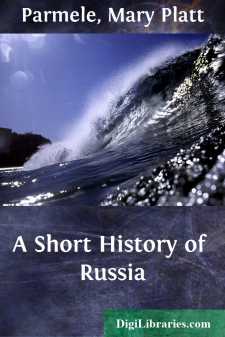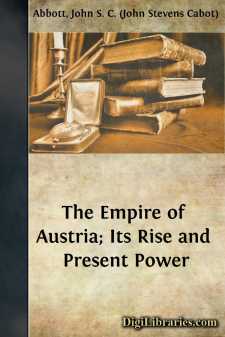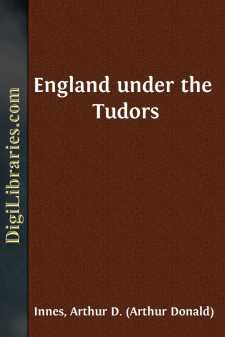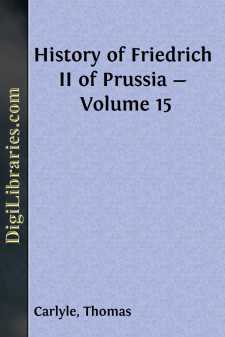History
- Africa 30
- Americas (North Central South West Indies) 50
- Ancient 68
- Asia 58
- Australia & New Zealand 8
- Canada 41
- Caribbean & West Indies 1
- Civilization 20
- Eastern Europe 12
- Europe
- Expeditions & Discoveries 60
- General 77
- Historical Geography 1
- Jewish 9
- Latin America 3
- Medieval 8
- Middle East 13
- Military 248
- Revolutionary 8
- Study & Teaching 5
- United States 353
- Western Europe 56
- World 13
Europe Books
Sort by:
by:
Thomas Carlyle
Chapter 1.1.I. Louis the Well-Beloved. President Henault, remarking on royal Surnames of Honour how difficult it often is to ascertain not only why, but even when, they were conferred, takes occasion in his sleek official way, to make a philosophical reflection. 'The Surname of Bien-aime (Well-beloved),' says he, 'which Louis XV. bears, will not leave posterity in the same doubt. This...
more...
CHAPTER I The topography of a country is to some extent a prophecy of its future. Had there been no Mississippi coursing for three thousand miles through the North American Continent, no Ohio and Missouri bisecting it from east to west, no great inland seas indenting and watering it, no fertile prairies stretching across its vast areas, how different would have been the history of our own land. Russia...
more...
by:
J.R. Green
CHAPTER I. THE EARLIER KINGS OF FRANCE. 1. France.—The country we now know as France is the tract of land shut in by the British Channel, the Bay of Biscay, the Pyrenees, the Mediterranean, and the Alps. But this country only gained the name of France by degrees. In the earliest days of which we have any account, it was peopled by the Celts, and it was known to the Romans as part of a larger country...
more...
by:
Jacob Abbott
Richard's Mother.The great quarrel between the houses of York and Lancaster.Terrible results of the quarrel.Origin of it.The mother of King Richard the Third was a beautiful, and, in many respects, a noble-minded woman, though she lived in very rude, turbulent, and trying times. She was born, so to speak, into one of the most widely-extended, the most bitter, and the most fatal of the family...
more...
I. I now undertake to write the history of a small party of men who, cast by Providence into the very centre of the greatest drama of modern times, comprise in themselves the ideas, the passions, the faults, the virtues of their epoch, and whose life and political acts forming, as we may say, the nucleus of the French Revolution, perished by the same blow which crushed the destinies of their country....
more...
CHAPTER I. RHODOLPH OF HAPSBURG. From 1232 to 1291. Hawk's Castle.—Albert, Count of Hapsburg.—Rhodolph of Hapsburg.—His Marriage and Estates.—Excommunication and its Results.—His Principles of Honor.—A Confederacy of Barons.—Their Route.—Rhodolph's Election as Emperor of Germany.—The Bishop's Warning.—Dissatisfaction at the Result of the Election.—Advantages...
more...
Not many of us remember Otterbourne before the Railroad, the Church, or the Penny Post. It may be pleasant to some of us to try to catch a few recollections before all those who can tell us anything about those times are quite gone. To begin with the first that is known about it, or rather that is guessed. A part of a Roman road has been traced in Otterbourne Park, and near it was found a piece of...
more...
THE TUDOR PERIOD, 1485-1603 [Sidenote: An era of Revolutions] The historian of the future will, perhaps, affirm that the nineteenth century, with the last years of the eighteenth, has been a period more fraught with momentous events in the development of the nations than any equal period since the Christian era commenced. Yet striking as are the developments witnessed by the last four generations, the...
more...
by:
Thomas Carlyle
Chapter I.—PRELIMINARY: HOW THE MOMENT ARRIVED. Battle being once seen to be inevitable, it was Friedrich's plan not to wait for it, but to give it. Thanks to Friedrich Wilhelm and himself, there is no Army, nor ever was any, in such continual preparation. Military people say, "Some Countries take six months, some twelve, to get in motion for war: but in three weeks Prussia can be across the...
more...
by:
Thomas Carlyle
Chapter I. — FIFTH CRISIS IN THE KAISER'S SPECTRE-HUNT. The Crown-Prince's young Life being, by perverse chance, involved and as it were absorbed in that foolish question of his English Marriage, we have nothing for it but to continue our sad function; and go on painfully fishing out, and reducing to an authentic form, what traces of him there are, from that disastrous beggarly...
more...











